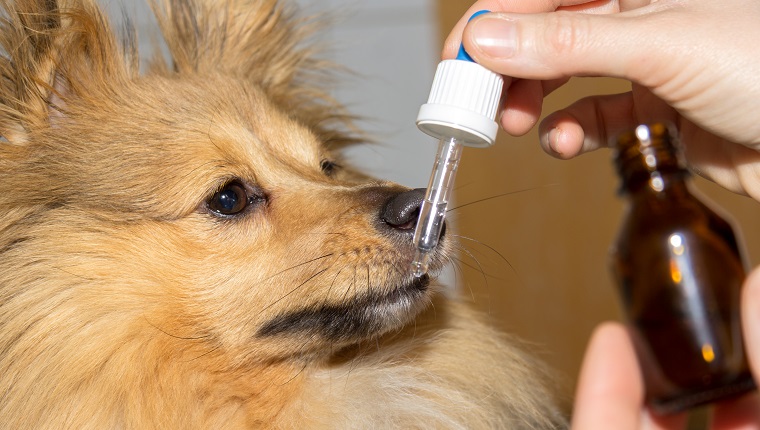Animal homeopathy, a branch of alternative medicine, is growing in size and popularity along with society’s interest in alternative medicine for humans. Homeopathy was first devised in the 1790s by German physician Samuel Hahnemann. Its key concept can be found in its name: homeopathy comes from the Greek word for like or similar, and that’s what homeopaths believe: “like cures like.”
At the foundation of homeopathy is the belief that every being–pets, as well as humans–has a self-healing response, and that health problems develop when something hinders that response or causes imbalance. Homeopathy views symptoms within the larger context of the individual’s overall health, and then tries to stimulate the body’s own healing responses.
Homeopathic remedies, therefore, cause symptoms similar to the ones the sick animal is already showing. For instance, animals who have diarrhea would be treated with–in incredibly tiny amounts–plants, minerals, or animal substances that cause diarrhea. The remedy replaces the illness, causing a cure by allowing animals’ own healing processes to overcome the condition. Thus, “like cures like.”
Before you decide to give your dog any medicine, homeopathic or otherwise, consult your vet, homeopathic experts, and canine health specialists. Internet research is great, but you also need to seek out professional guidance. Your dog’s health depends on you doing your due diligence before you make important health decisions.
The Debate About Homeopathy
Homeopaths use ingredients derived from herbs, minerals, and natural substances diluted beyond the point of toxicity. In fact, homeopaths believe that the more diluted the substance, the higher the potency and less frequently it has to be given.
This means that, by and large, homeopathic medicines are safe and produce few side effects, even when they sound ominous. Some of the most common compounds include ingredients such as sulfur, bee venom, and even poison ivy.
This is a distinctly different approach than that used by traditional Western veterinary medicine. There’s a great deal of debate about whether the benefits of homeopathy are real and provable. The homeopathic stance against vaccination, which is seen as causing an artificial imbalance of the body’s vital energies, is particularly controversial.
Still, thousands of dog owners around the world believe strongly in its power to heal and maintain health. A growing number of veterinarians are trained in homeopathic, as well as Western medicine.
What Conditions Should I Use It For?

There are more than 2,000 homeopathic remedies available, and they address a wide range of chronic and acute conditions. Basically, for any of the ailments that modern dogs suffer, from viruses to bacterial infections, from respiratory disease to kidney dysfunction, there’s a homeopathic remedy.
How Will A Homeopath Treat My Dog?
When you first visit a homeopath, they should do a physical exam and ask a lot of questions. After all, the key to success in homeopathy is individualization. That means two dogs diagnosed with the same disease may present entirely different symptoms. Therefore, they may receive entirely different homeopathic remedies.
A homeopath needs to explore all your dog’s symptoms: What is the exact nature of the symptoms? What time of day do they occur? What is your pet’s overall demeanor and behavior? With this information in hand, the homeopath will decide which symptom to address first. The method is always to tackle just one symptom at a time, with as little interference from other medications or treatments as possible.
Remember, even its greatest proponents say homeopathic medicine has limits. Because it relies on the natural healing properties of the body, if the body already suffered damage through disease or accident, homeopathy won’t be effective. If it’s a matter of a traumatic disease or accident, alternatives such as surgery and antibiotics are likely necessary.
What To Expect When Giving Your Dog Homeopathic Medicines

Just as homeopathy differs philosophically from conventional medicine, there are differences in how to administer remedies. Here are just a few of the things you should keep in mind:
- Don’t give the remedies with food. Give homeopathic medicines at least an hour before or after feeding. That way the food and the medicine won’t interfere with each other.
- Don’t give your dog any other medications unless your homeopath approves them. This includes other homeopathic remedies as well as conventional medications. Although homeopathy is often used along with other alternative therapies such as chiropractic, massage, acupuncture, or even magnet therapy, check with your homeopath before you use them.
- Homeopaths believe that vaccination interferes with homeopathic treatment.
- Sometimes symptoms may actually worsen after treatment, but only for a little while. This is known as “homeopathic aggravation,” and homeopaths believe it to be part of the healing process. Homeopaths will tell you that this will end quickly and that an even faster recovery will follow.
- There may be “discharges” as part of the healing process. This can include diarrhea, discharges from the eyes, skin, or nasal passages, or even “behavioral discharges,” such as showing new fears or sleeping in a new location. As difficult as this might be to watch, homeopaths suggest that you do not interfere with these. They’re considered to be good signs, marking the beginning of healing.
How To Choose A Veterinary Homeopath
The first and best method is always referral. If you have friends or relatives who have used homeopathic remedies with their pets, ask who they work with. Even if their practitioners aren’t in your area, they may know someone near to you.
Talk with your own vet, as well. Though he or she may not have received training in homeopathy, many of the country’s largest veterinary schools offer classes and certifications in the field, as well as in other holistic practices. Your own vet may be a better resource than you realize.
You can also learn more about the subject and find referrals online at a variety of sites maintained by groups such as the Academy of Veterinary Homeopathy.









